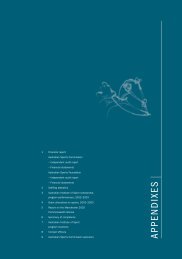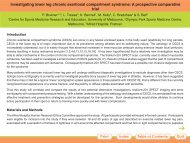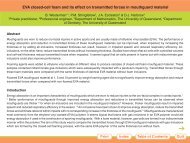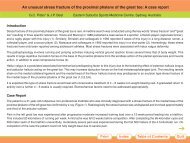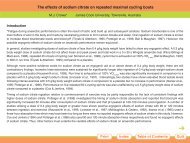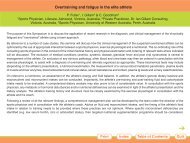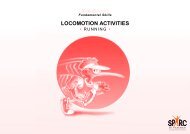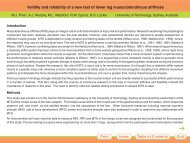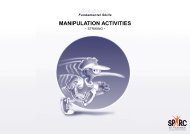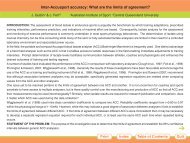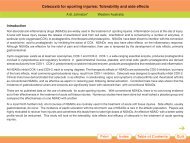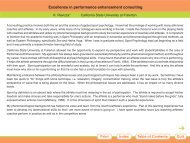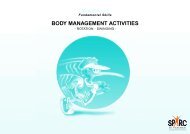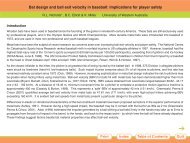2002-03 Annual R eport 2002-03 Annual R eport - Australian Sports ...
2002-03 Annual R eport 2002-03 Annual R eport - Australian Sports ...
2002-03 Annual R eport 2002-03 Annual R eport - Australian Sports ...
You also want an ePaper? Increase the reach of your titles
YUMPU automatically turns print PDFs into web optimized ePapers that Google loves.
Back, left to right: Michael Clarke, Jimmy Maher, Martin Love, Andrew Bichel, Stuart MacGill, Bradley Hogg.<br />
Middle, left to right: Tim Nielsen (Assistant Coach/Performance Analyst), Errol Alcott (Physiotherapist), Lucy Frostick (Team Massage Therapist), Darren Lehmann, Brett<br />
Lee, Jason Gillespie, Brad Williams, Ashley Noffke, Jock Campbell (Physical Performance Manager), Jonathan Rose (Media Manager).<br />
Front, left to right: Matthew Hayden, Glenn McGrath, John Buchanan (Coach), Ricky Ponting (Vice-captain), Stephen Waugh (Captain), Stephen Bernard (Team Manager),<br />
Adam Gilchrist, Justin Langer.<br />
TRAVELEX TOUR OF THE WEST INDIES, <strong>2002</strong>-<strong>03</strong><br />
Australia regained its place at the head of the International<br />
Cricket Council’s Test World Championship ladder – lost before<br />
Christmas when South Africa beat Pakistan – with a 3-1 series<br />
win in the Caribbean, and then followed it up with a 4-3 victory<br />
in the one-day series, confirming its status as World Champions<br />
and setting a new mark for successive one-day wins at 21.<br />
The West Indies did rally to take advantage of some signs of<br />
tiredness among Australia’s players, and secured consolation<br />
wins in both forms of the game. Their victory in the final Test in<br />
Antigua broke the record for the highest-ever successful runchase<br />
when they reached 7-418.<br />
However, it was Australia that retained the Frank Worrell Trophy<br />
and added the one-day silverware to its bulging trophy cabinet.<br />
Both successes were fully deserved.<br />
In the Test series, Stephen Waugh’s side scored its runs quickly<br />
enough to dismiss the West Indies twice, and that time was<br />
needed as all four Tests – in Guyana, Trinidad, Barbados and<br />
Antigua – were played on pitches that offered the bowlers<br />
precious little encouragement.<br />
Ricky Ponting was the man to take the biggest advantage of<br />
those surfaces as he totalled 523 runs in three Tests with scores<br />
of 117, 42*, 206, 45 and 113 before illness, possibly induced by<br />
fatigue from the amount of time he batted, cost him his place in<br />
the final match. Ponting, who was named vice-captain of the<br />
Test side instead of Adam Gilchrist, ahead of the tour, was<br />
named player of the Test series.<br />
Ponting was one of six <strong>Australian</strong> players to score at least one<br />
hundred during the Test series. Justin Langer and Matthew<br />
Hayden managed two each, while there was one apiece for<br />
captain Stephen Waugh, Adam Gilchrist and Darren Lehmann,<br />
the latter his first at the highest level. It meant Australia was<br />
rarely short of runs.<br />
Without the suspended Shane Warne and with Glenn McGrath<br />
absent for the first two Tests as he stayed with his sick wife at<br />
83<br />
home, Australia had to look elsewhere for wickets and they<br />
were provided, in the main, by fast-bowlers Jason Gillespie and<br />
Brett Lee, and leg-spinner Stuart MacGill. That trio formed the<br />
most potent parts of a five-man attack, as Australia opted to<br />
break with recent selection policy by pushing Gilchrist up to<br />
number six in the order to allow the inclusion of an extra bowler.<br />
Gillespie topped the Test averages with 17 wickets, including his<br />
150th in Tests during the win in Guyana. Lee also managed 17<br />
wickets, while MacGill claimed 20 victims, the most by any<br />
bowler in the Test series, including a match-winning haul of<br />
nine wickets in Barbados. Andrew Bichel took 11 Test wickets as<br />
well as claiming the prize scalp of Brian Lara seven times in<br />
Test and one-day action during the tour.<br />
The one-day squad won its series with victories in Jamaica<br />
– twice – plus St Lucia and Trinidad, but once the prize was<br />
secured, the players were unable to lift themselves sufficiently<br />
for the final three matches against a West Indies line-up that<br />
was playing for pride.<br />
Andrew Symonds, along with Ponting, one of only two everpresents<br />
in the one-day side, made the most runs – 275<br />
– while Lee confirmed his new-found reputation as one of the<br />
best one-day bowlers in the world with 11 wickets in six matches.<br />
The West Indies relied heavily on Lara, appointed as captain for<br />
the second time just prior to the tour, and he responded with<br />
533 Test runs and 242 runs in the one-day series. Ramnaresh<br />
Sarwan and Shivnarine Chanderpaul both averaged more than<br />
40 in the Test series and both men topped three figures in the<br />
epic run-chase in Antigua. For the most part, however, it was<br />
the West Indies’ lack of a cutting edge with the ball that cost it<br />
most dearly. Fast-bowler Jermaine Lawson emerged to take a<br />
Test match hat-trick in Barbados, but he ended the series with<br />
his bowling action under intense scrutiny.<br />
Wavell Hinds, dropped after the second Test, bounced back to be<br />
named player of the one-day series by scoring 352 runs in five<br />
matches, while Chris Gayle scored 275 runs and took 11 wickets<br />
with his off-spin.<br />
T ravelex Tour of the West Indies, <strong>2002</strong>-<strong>03</strong>



